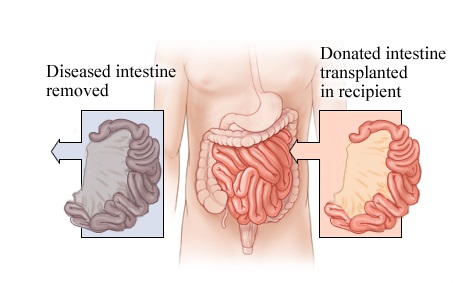Intestine Transplant
Intestine Transplant Treatment at GoodGrowthHealthcare
Understanding Intestine Transplantation
Intestine transplant, also known as bowel transplant, is a complex surgical procedure aimed at replacing a diseased or malfunctioning intestine with a healthy donor intestine. This procedure is typically considered for individuals with severe intestinal failure, often resulting from conditions such as inflammatory bowel disease, congenital defects, or trauma.

Reasons/Causes for Transplant
1. Severe Intestinal Failure: Intestine transplant becomes necessary when individuals experience severe intestinal failure, which can result from conditions like irritable bowel syndrome (IBS) and inflammatory bowel disease (IBD).
2. Complications from Previous Surgeries: Individuals who have undergone previous surgeries may develop complications leading to intestinal failure, making them candidates for an intestine transplant.
3. Congenital Defects: Congenital defects affecting the intestines can contribute to intestinal failure, prompting the need for a transplant to restore normal digestive function.
4. Trauma: Traumatic injuries to the intestines, whether from accidents or other incidents, can lead to irreversible damage, requiring intervention through an intestine transplant procedure.

Intestine Transplant Process
Pretransplant Workup:
Before the transplant, patients undergo thorough tests to check their health and see if they’re a good fit for the surgery. This includes exams like colonoscopy, imaging scans, and blood tests to make sure they’re ready for the transplant.
Transplant Surgery:
During the surgery, the damaged part of the intestine is taken out, and the healthy intestine from the donor is put into the patient’s body. The surgical team carefully connects blood vessels and ensures the new intestine works properly to restore digestion.
Post Transplant Care:
After the transplant, patients get special care to watch their recovery and avoid problems. They may need medicines to stop the body from rejecting the new intestine, along with changes to their diet and regular check-ups with doctors to make sure everything stays on track for the long run.
Success Rate
Intestinal transplant survival rates vary, with current statistics showing a success rate of around 70% or higher in certain cases. The outcome of intestine transplant procedures hinges on several factors, including the patient’s general health, the severity of intestinal failure, and how well they follow post-transplant care instructions. Goodgrowthhealthcare is dedicated to achieving excellent success rates by harnessing the expertise of our medical professionals and utilizing cutting-edge facilities, ensuring the best possible results for our patients.

